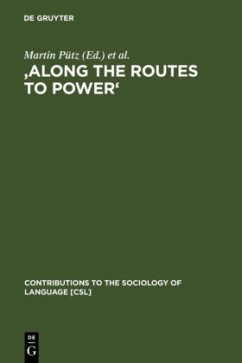The present volume grew out of the 30th International LAUD Symposium, held on April 19-22, 2004 at the University of Koblenz-Landau in Landau, Germany. The conference, "Empowerment through Language", was centrally concerned with the concept of power and/or empowerment as observed in the status and use of language(s) and their speakers in bilingual and multilingual communities. The book discusses the theoretical issues inherent in the relation between language and power, the empowerment strategies involved in language policy and language planning situations, and the issue of language endangerment in Africa, i.e., the fate of minority languages and their speakers and the sociopolitical factors perpetuating their exclusion from access to knowledge and skills.
The volume constitutes a collection of papers by prominent linguists from many countries who explore the exciting interdisciplinary area of language, power, and linguistic empowerment. Broadly speaking, the papers focus on the theoretical and sociolinguistic problems related to the role of power in language policy and language planning situations in multilingual settings, language choices, code switches, and associated topics. Thus, the aim of the volume is to open up language policy and language planning issues as observed in multilingual contexts (nations, institutions, other settings, and domains) to the wider community of critical sociolinguistics by concentrating on the relationship between language and power. More particularly, it offers a decidedly sociolinguistic perspective to the study of language and power, which likewise has been tackled from other perspectives in the areas of sociology and political science. This interdisciplinary relationship is important both for linguistics and for the sociology of language. In this way, the book is an important contribution to general linguistics, sociolinguistics, minority issues in multilingual settings as well as the social sciences.
In honor of his upcoming 80th birthday (2006) , Fishman's colleagues and former students are preparing five volumes by him or about him, this being one of them.
The volume constitutes a collection of papers by prominent linguists from many countries who explore the exciting interdisciplinary area of language, power, and linguistic empowerment. Broadly speaking, the papers focus on the theoretical and sociolinguistic problems related to the role of power in language policy and language planning situations in multilingual settings, language choices, code switches, and associated topics. Thus, the aim of the volume is to open up language policy and language planning issues as observed in multilingual contexts (nations, institutions, other settings, and domains) to the wider community of critical sociolinguistics by concentrating on the relationship between language and power. More particularly, it offers a decidedly sociolinguistic perspective to the study of language and power, which likewise has been tackled from other perspectives in the areas of sociology and political science. This interdisciplinary relationship is important both for linguistics and for the sociology of language. In this way, the book is an important contribution to general linguistics, sociolinguistics, minority issues in multilingual settings as well as the social sciences.
In honor of his upcoming 80th birthday (2006) , Fishman's colleagues and former students are preparing five volumes by him or about him, this being one of them.
"[...] an outstanding volume addressing an important and timely issue. Along the routes to Power is cogent, thoughtfully constucted, and not only meets high academic standards and levels, but also provides a compelling case for why issues of language and power are important both for sociolinguists and for others concerned with social justice."Timothy Reagan in: Language Problems and Language Planning 1/2008 "This book contains powerful and persuasive writing from a team of top international scholars. It is ground-breaking by impressively focusing on how power and empowerment are foundational to the health and prospect of all the world's languages. This book announces the centrality of the 'sociolinguistics of power' by confronting researchers, teachers, and planners across various language and cultural disciplines with 'power and empowerment' as crucial to any modern understanding of languages."Colin Baker, University of Bangor, Wales
"[...] an outstanding volume addressing an important and timely issue. Along the routes to Power is cogent, thoughtfully constucted, and not only meets high academic standards and levels, but also provides a compelling case for why issues of language and power are important both for sociolinguists and for others concerned with social justice."
Timothy Reagan in: Language Problems and Language Planning 1/2008
"This book contains powerful and persuasive writing from a team of top international scholars. It is ground-breaking by impressively focusing on how power and empowerment are foundational to the health and prospect of all the world's languages. This book announces the centrality of the 'sociolinguistics of power' by confronting researchers, teachers, and planners across various language and cultural disciplines with 'power and empowerment' as crucial to any modern understanding of languages."
Colin Baker, University of Bangor, Wales
"[...] an outstanding volume addressing an important and timely issue. Along the routes to Power is cogent, thoughtfully constucted, and not only meets high academic standards and levels, but also provides a compelling case for why issues of language and power are important both for sociolinguists and for others concerned with social justice."
Timothy Reagan in: Language Problems and Language Planning 1/2008
"This book contains powerful and persuasive writing from a team of top international scholars. It is ground-breaking by impressively focusing on how power and empowerment are foundational to the health and prospect of all the world's languages. This book announces the centrality of the 'sociolinguistics of power' by confronting researchers, teachers, and planners across various language and cultural disciplines with 'power and empowerment' as crucial to any modern understanding of languages."
Colin Baker, University of Bangor, Wales

